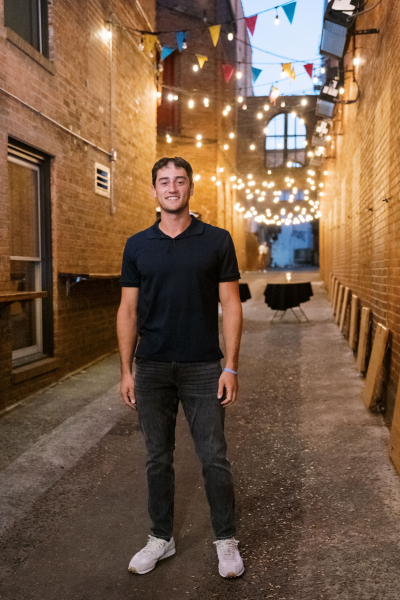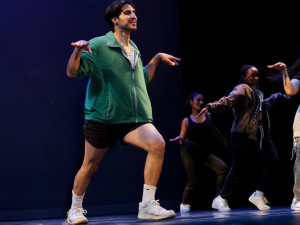Physics and Music Create Interstellar Rhythms

Physics major Michael Bell first became interested in the subject as a junior in high school.
“I took an Intro to Physics course and after asking too many questions that were ‘beyond the scope of the class,’ my teacher introduced me to the basics of string theory — and I was hooked,” he says.
Bell soon found himself contemplating “physics-breaking” questions like: Is Force = mass * acceleration still true for an object with zero mass? Although he would eventually arrive at the answers, he rarely understood them. So, he invented a game where he’d ask himself a question, then ask “why” after every subsequent answer until he drilled down to the root of the reason.
“The reason always ended in physics, so I decided that studying the subject in college would be the most fundamental way to become more knowledgeable about our world.”
He spent the summer of 2023 working with the High Energy Physics group, studying proton-proton collisions, and he’s currently conducting an independent study with the Duke Cosmology Group to improve the time efficiency of the galaxy simulation program, Galsim. Bell says the study aims to increase the speed at which astrophysicists can capture and analyze images of the Universe.
With his focus firmly on Physics, Bell has also made space in his studies to minor in Music.
Raised in a family with musical interests and inclinations, Bell remembers many family trips to see musicals, and his parents always encouraged their children to study a musical instrument. As a result, he’s played guitar for most of his life, taking classical and jazz guitar at Duke. And thanks to his classes, he’s learned how to engage with music thoughtfully and spends most of his free time listening to, playing and writing music.
“It’s rewarding to apply knowledge from the classroom directly to my personal life,” he says.
Bell plans to spend his professional life contributing to space exploration — with aspirations of becoming an astronaut. But for now, he’s applying to graduate school with the ambition of conducting space-related research for the next handful of years.
We sat down with the senior to learn how he arrived at his specific STEAM path, how he’s benefitted from his interdisciplinary studies and if he feels Duke nurtures a STEM + the arts education.
You have this longstanding love of Physics, so how did a minor in Music become part of your scholarship?
I had no intention of taking music courses at Duke. My Plan A was strictly Physics and medicine. However, my Trinity advisor, April Henry, encouraged me to begin my first semester at Duke with an eagerness for exploration. So, I went out on a limb and filled my last class slot with Music Theory 161. After a couple of weeks, I knew I would minor in music.
In that class, I marveled at the idea that construction of Western music theory is deeply rooted in math and physics. The simple mathematical intervals that separate musical notes also give rise to beautiful consonances and dissonances that can be understood through the lens of physical wave mechanics.
Moreover, learning music theory supplied me with the tools to interact more meaningfully with the music I enjoy listening to — an effect I could’ve predicted, I suppose, but not one I’d imagine would have such a positive impact on my academic and creative motivations.
Have your Physics and Music courses been mutually beneficial?
I couldn’t say whether Music has directly benefited my Physics studies, or vice versa, but that’s precisely the beauty of attending a liberal arts college. For me, course schedule diversity is refreshing and offers a healthy learning experience.
And it’s particularly nice that Physics is generally objective, while Music is generally subjective. The distinction forces my brain to be comfortable with both methods of learning.
As an undergrad focused on Physics, who decided to minor in Music, do you find that Duke facilitates a STEAM education?
Yes and no. My physics advisor has certainly encouraged multidisciplinary studies — he’s a music enthusiast himself. And while I think Duke does a great job of providing the right environment for STEM and the arts, it would be great to see more courses offered that explicitly combine the two. This way, it will be more apparent to students that there are real benefits to a multidisciplinary approach to learning.




